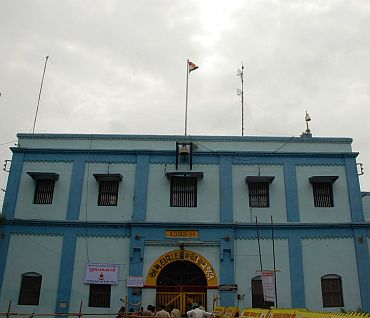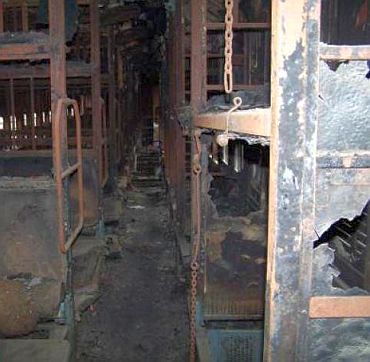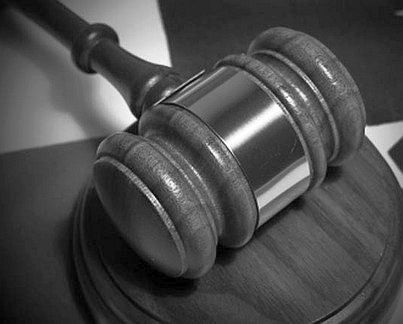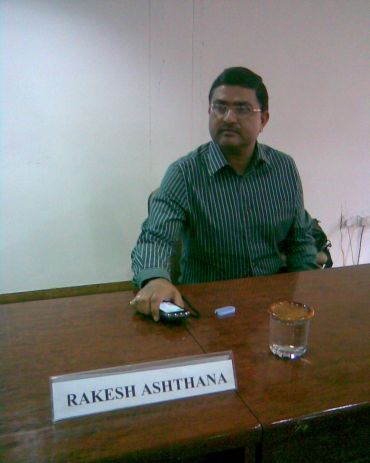 | « Back to article | Print this article |
'Godhra ruling will set the trend against mob violence'
Rediff.com's Sheela Bhatt was in Ahmedabad when the judgment in the Godhra train burning case was pronounced on Tuesday. She has also followed and written about the twists and turns in the historic nine-year legal battle. Her analysis of the verdict
On Tuesday, February 22, at 11.07 am, Judge P R Patel came to the makeshift courtroom inside the historic Sabarmati jail with two sets of papers. One set he gave to the prosecution side and another to the defence lawyer. They contained the names of 63 accused who had been acquitted and the 31 who had been convicted.
Most importantly, he announced that he has applied Section 302, Section 120-B, Section 149, 307, 323, 324, 332 of the Indian Penal Code to the 31 accused and he has also upheld the charge of conspiracy against them. That was the most important part of the judgment because it has the power to polarise opinion in India. The Godhra train carnage was not an accident, said the court. It believes that it was a preplanned conspiracy.
This judgment is historic because, in India, incidents of communal and mob violence are quite common but the conviction rate in cases related to them is quite low. A senior police officer related to the case told rediff.com, "This case is the first of its kind where more than 25 people are being convicted on serious charges of mob violence. This will set a trend. It is very difficult to build up a case against each of them. It is very heartening that the court has accepted our arguments and convicted 31 persons."Click on NEXT to read further...
Also Read:
Special series: The politics of evidence
Why Suhas Patel almost became a rioter
Youth's testimony throws new light on Godhra attack
'Hindus started it, Muslims took it to climax'
Justice after 9 years for 63 accused
Some 25 lawyers were present in the courtroom, including Public Prosecutor J M Panchal.
There is a barrack adjoining the courtroom where the accused had been sitting throughout the trial, for security reasons, that began in June 2009 and went on till September 2010. Once the trial started it went on without any hitches and proceeded quite fast.
Before delivering the judgment in the case relating to the carnage on Sabarmati Express at Godhra on February 27, 2002, Judge Patel read out all the names of the 63 accused loudly. Everyone present was surprised. There was pin-drop silence as the names were being read out.
As the judge started announcing the names these accused persons were stunned.
"Irfaan Pathan, Shaukat Pathan, Mohammed Ansar, Yasin Malek, Mohammed Chakda, Nasir Pathan, Ibrahim Kalota, Baitullah Taili "
As Judge Patel went on announcing the 63 names, the accused kept coming out of the barracks on the other side of the courtroom. In a few minutes, all the acquitted accused had come out.
It was an unbelievable day for those who have lost nine years of their lives, their dignity and a lot more. Almost all of them are poor and without much backing. For those who have been acquitted, the judgment meant that they are neither criminal nor communal.
Irfan Munshi, lawyer for some of these acquitted accused, says, "The judge said keep these 63 accused separately. They have been acquitted. All the accused started hugging each other and thanked God. They were a little restrained in expressing their happiness. They were dazed to see good luck coming their way."
For the accused, punishment may be harsh
Then the judge asked that the other 31 accused be kept inside the barracks only.
The historic criminal case took nine years because of the legal battle between the Gujarat government and many non-government organisations. Except Maulvi Omerjee and Mohammed Hussain Kalota, the Gujarat police are not at all surprised that the other 61 accused have been released.
Since they were arrested in 2002, the Gujarat police wanted the trial to begin soon so that the court can release them. The team of Rakesh Asthana, the man who investigated the case, had not focussed on them. The police team which took action soon after the incident had arrested them.
But due to innumerable court cases against the Gujarat police's investigation, the application of the Prevention of Terrorism Act and due to the vitiated political atmosphere, these accused remained sandwiched between the two warring sides. No amount of pressure from civil society worked and in spite of the general belief that they were innocent, they could not be released due to the non-commencement of the trial.
The battle between the Gujarat establishment led by Chief Minister Narendra Modi and secular organisations ended up harming these poor people because of the ensuing delay in the trial. Unfortunately, they remained in jail and have suffered unbearable injustice. In fact, the trial itself did not take long once it started in June 2009 after the Supreme Court lifted a stay against it.
However, the judge has not given a copy of the 850-page judgment as yet. The quantum of punishment will be decided on February 25. But since the conspiracy charge has been accepted and even the theory of the Gujarat police that the S-6 compartment was torched from inside has been accepted, it is expected that the punishment will be harsh. Prosecutor Panchal said that in view of the horrific crime the judge should opt for the harshest option under law, which is the death penalty.
The judge has given the benefit of the doubt to Omerjee and acquitted him as his presence at the spot where the conspiracy was hatched was not proved. The police investigation could not provide any corroborative evidence.'Our entire investigation has been vindicated'
However, it is important to note that the entire case has been dependent on statements by four witnesses and by one accused, Zabbir bin Yamin Behera, who has been convicted.
Ajay Bareiya, Sikandar Sheikh, Prabhat Singh and Ranjit Jodha, the four witnesses, have been given police protection since 2005 by the court. Ajay is a tribal boy born and brought up in the Muslim ghetto of Signal Falia. He was working in Godhra under a pseudonym. Sikandar is a poor labourer from Signal Falia, who is now in hiding in Surat, while Ranjit and Prabhat were poor farmers who in 2002 were working at a petrol pump from where Razak Kurkur's boys collected 120 litres petrol on the night of February 26 that year. They have gone back to farming now.
The prosecution's case that Kurkur, owner of Aman Hotel and one of the main accused, had collected the team of young boys to set fire to S-6 compartment of the Sabarmati Express has been upheld. The court has accepted the theory that petrol was poured on the floor of the compartment from inside on February 27 by Jabir Behra, Irfaan Kalander, Shaukat Charkha alias Lalu, Mehmood Latifa and Imraan Sheru. They surrounded the S-6 compartment and went inside to burn the train. The prosecution side expects the harshest punishment for them. Shaukat Charkha and Imraan Sheru are, reportedly, in Pakistan along with another accused, Salim Paanwala.
According to Y A Hasan, lawyer for many of the accused, "The entire case is based on circumstantial evidence and conviction is just not possible, but let's see how the judge has decided. We will accept the judgment and go to a higher court. The four statements of Ajay, Sikander and the two salesmen of the petrol pump were recorded many months after the event, when Noel Parmar became the investigating officer in the case. Prabhat and Ranjit have changed their statements, which is beyond our logic."
"What kind of a case and what kind of investigation is this where two-thirds of the accused have been acquitted? Out of the 94 accused in the case, 63 have been released," says I M Munshi, lawyer for some of the accused.
"We are not satisfied," said Munshi, "We never know who will become a hero and who will turn zero in a police investigation."
Rakesh Asthana, who supervised the entire investigation, refused to elaborate at this stage. But he told rediff.com, "Our entire investigation has been vindicated, that's all I can say."



